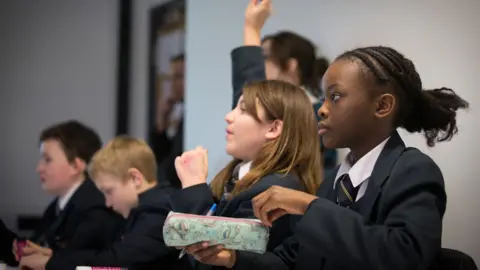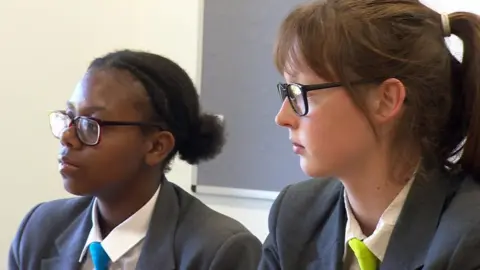School spending on pupils cut by 8%, says IFS
 Getty Images
Getty ImagesThe amount of per pupil spending in England's schools has fallen by 8% since 2010, says an analysis by the Institute for Fiscal Studies.
The study says rising pupil numbers - and cuts to local authorities and sixth form funding - have seen a real-term reduction in school spending.
Heads say it disproves government "rhetoric" about record funding levels.
The Department for Education says funding will be at its "highest ever level", reaching £43.5bn by 2020.
School leaders have been protesting that cash shortages have forced them to cut staff and to ask parents for financial assistance - but the government has argued that school funding has been protected.
Rising pupil numbers
This research from the IFS definitively concludes that total funding per pupil in England has been reduced, when looked at in the round, taking into account changes in pupil numbers and different routes of funding schools and age groups.
Head teachers say it should end the government's "insistence" that funding had not been reduced.
The study says efforts since 2010 to protect school budgets have focused on pupils up to the age of 16 - at the expense of sixth form funding and support through local authorities.
Sixth form funding has been cut by 25% and local authority support is down by 55%. Between 2015 and 2017 the core budget up to the age of 16 fell by 4%, says the IFS analysis.
When the sharp rise in pupil numbers is also taken into account, the IFS says there has been a 8% overall reduction in the money spent per pupil between 2009-10 and 2017-18.
'Significant' funding cuts
The study compares school funding in England and Wales - and says because of the greater population surge in England, per pupil funding has fallen more sharply there, with per pupil funding in Wales down by 5% since 2009-10.
"School spending per pupil has fallen by more in England than in Wales over the last eight years, virtually eliminating the gap in spending per pupil between the two countries," said Luke Sibieta, research fellow at the IFS.
This analysis on funding comes as schools are anticipating even further financial pressure - with the teachers' pay round expected soon.
Geoff Barton, leader of the ASCL head teachers' union, wrote to the education secretary last week warning that unless there was extra funding for teachers' pay, it would be "catastrophic" and effectively leave schools insolvent.
An above-inflation pay rise, suggested to be in the region of 3.5%, is expected to help tackle a teacher shortage - which the education secretary has said is a "top priority".

Responding to the IFS report, Mr Barton said "the facts could not be more plain".
"Despite the government's repeated insistence that it is spending record levels on education, the reality is that it has significantly cut funding per pupil in real terms.
"The scale of these cuts is a devastating indictment of its commitment to education and has put educational standards in jeopardy."
'Most out of every pound'
Mr Barton said schools would have "no choice" but to cut back on what they were able to offer pupils - and he accused ministers of failing to respond to a "crisis which has developed under their watch".
Shadow education secretary, Angela Rayner, said: "This analysis is just the latest evidence of the damage that Tory cuts have done to our schools, denying a generation of children the opportunities they deserve."
 Getty Images
Getty ImagesA Department for Education spokeswoman said that "School funding in England is at its highest ever level, rising to £43.5n by 2020."
"In fact, analysis from the Institute of Fiscal Studies itself has shown that real terms per pupil funding for 5-16 year olds in England in 2020 will be more than 50% higher than it was in 2000.
"We have also protected the base rate of funding for 16-19 year olds until 2020, worth £4,000 per student for 16-17 year olds."
